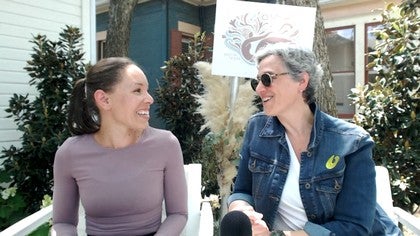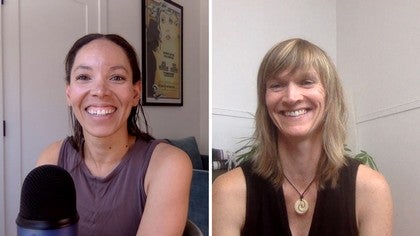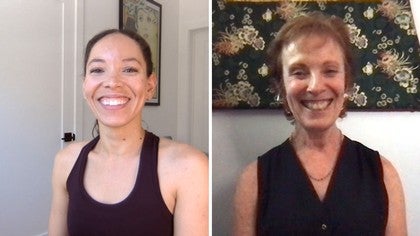Discussion #4979
State of the Industry
Description
About This Video
Transcript
Read Full Transcript
(rhythmic music) Hi everyone, I'm Gia. I'm here with the Pilates Report. We're excited to be here at the Pilates Align Summit in Austin, Texas. Live. Live.
And I'm here with Joy Puleo from Balanced Body. Hi everyone. Hi, I'm so excited to have you here and talk to you about things. I so excited to be talking to you like this, instead of- I know, and not at home. Just like that, yeah, very cool.
I know. We're gonna be going over just what's happening in the industry right now. And we are outdoors, so if you hear any outside noises, please, excuse us 'cause we're just on the nice patio at the Align Pilates Studio. Right, right. So for those who don't know you, Joy, can you tell us what your position is at Balanced Body?
Hi everyone. So this is actually sort of my first coming out as the director of education for Balanced Body. So this, over the COVID, during those past two years, the previous directors, Al Harrison and Nora St. John, have decided to take different paths. Nora is totally going creative, and Al has decided to graduate. And so now I'm taking over as the education director.
And as such, all things education in the industry really will start to come through me. That's amazing. Yeah, it's really been cool. It's been an exciting journey. Yeah, and you've been there for a long time so it's just so nice, that- So I started with Balanced Body as a master instructor when I had a studio in New York.
Yeah. And then in 2013, I literally got a phone call from Al Harrison saying, we need help with curriculum. Are you interested? And I packed my family up and we moved out to Sacramento. That is a huge transition from New York to Sacramento.
My clients all said the same thing. And they said, you're going where? At San Francisco? And I was like, not really. (laughs) They're like LA, probably.
Yeah. Yeah. But Sacramento, it proved to be a really nice little surprise. That's amazing. Yeah, I'd love to go, I've never been to the Balanced Body headquarters, but I need to go one of these days. You do absolutely need to come and you need to come and take a tour of the facility.
Yeah. It's really amazing 'cause we actually manufacture in the facility. That's so great. Yeah, it's very cool. So I wanna go into teacher training, since that's your forte.
Perfect. Are you noticing that there's still an interest in teacher training? Like have you seen that increase or decrease in the last two years? And so we've seen some really interesting trends. So the first thing is, yes, there is an interest in teacher training.
And the interest in teacher training continues to grow. But there of course was a pivot- Yeah. To online training. So now we're back in this, in this kind of space where people are coming back to live and then there's still some online. So we're trying to ascertain who's coming back live, who's wanting to stay online, what does that mean?
And then how do we start to integrate that into movement education in the future. But in terms of interest, there is absolutely interest in teacher education now. And it's really exciting. Yeah. Because studios also need instructors.
Yeah, and it's just really exciting that the studios, or the industry's still continuing to grow because we didn't know what was gonna happen over the last couple years. You know, listen a lot of studios transitioned during COVID. Yeah. But the studios that are opening their doors again, to a one, they're all saying that they're full, that their clients really wanna come back, they're seeing sort of an increase in the desire to have the one-on-one touch again. Yeah.
So we're kind of going back a little bit in time. That's awesome. And they're all saying they needed instructors. That's so great. So how are you navigating teacher training with, like, or how did you navigate it with COVID and what are your plans to continue it?
Right, so as with, just about everybody in the industry- Yeah. With like, it feels like within 24 hours everybody knew what Zoom was. Yeah. Like overnight. And, and we did transition a lot of our coursework to virtual.
And a really interesting thing happened. Clients who were interested in education, sort of like education light, they might not wanna be an instructor but they wanted to get some just general background. They were coming to the online trainings. Teachers who maybe put off finishing their trainings wanted to get training. There was a lot of training in terms of around mat.
Oh, yeah. Because so many instructors, or were former instructors, and suddenly they had to teach mat again. Yeah. Right? So we, we pivoted to online and and now that sort of everything is opening, the next question is what is the best application for online training?
Like does it, can you really teach full, comprehensive online and be successful at it and be a successful teacher? So now we're looking at what does successful online education look like? Yeah, and I think a few years ago everyone would probably would've said, no, you need to be in person. You need that tactile touch, and, it's a change. And so I've been doing this a long time and there's been these shifts in teacher training, from apprenticeships, no manuals- I've tried it.
To manuals, right, yes, we like sat, and we listened, and it took a long time Yeah. About an idea before we were ever allowed on a reformer and now we're into like, weekend modules. Yeah. And making it accessible, having manuals, right? So there's already been- A big shift.
A big shift. And so now the question is what's the next responsible shift? Yeah. Right? Can you really teach footwork without ever looking at five or six people in front of you?
Yeah. With different leg alignments. Exactly. And it's, it's just a real question that I have at this point and starting to do some research on best application for online education and we'll keep you all informed once we know. That's amazing.
Now that everything's kind of, kind of a hybrid, like there's Zoom teaching still, there's virtual. Are there skills that teachers need to learn in teacher training or even after teacher training like teaching virtually, like how do you go about that? So, okay, so that's still another question like, in teacher training- Yeah. Do we have to have the like, I mean, you guys don't even know this, but we have a setup here. We have a microphone in here- Yeah.
We have a camera like, do we have to include that into teacher trainings? Yeah. Like how to train online? And I do think that that's going to be an important part of, not everyone will want it. Yeah.
But for those who do, it's a completely different set of skills that you need with cuing- Yeah. How how to hone eye. Yeah. Like you could be looking at someone from the waist down and sort of having an understanding of what's happening. Your different teaching persona needs to come out in each circumstance.
Yeah. And you have to decide who that is and what you wanna share. Yeah, it's also even figuring out your tech, like never would I thought that I'd be going to the airport with my tripod, my mic, my webcam, to go to a Pilates conference, so interesting. Right, right. I never thought that we'd be talking about like, exchanging dongles.
Yeah. (laughs) Like these are things that just weren't, for Pilate's instructors, just weren't things that we thought we needed. Now listen, the plus side is we're able to reach a lot more people. Exactly, right, so cool. And the more you get eyes on you the more you, education is a sticky thing.
Once people get a sense of the education and the value of education and they learn a little bit more about their bodies, it really becomes almost addictive. Yeah. And so having more eyes on you having more clients with you, it's, there is a positive, there. Are you seeing that the new teachers are actually finding jobs easily or, is there like, a huge hunger for like, teachers at studios? If you are a teacher and you wanna go back to a studio, now is the time.
There is a huge, like huge, hunger for teachers inside the studios. This is a transition that's gonna be challenging because a lot of teachers went online. Yeah. And they're thriving online. Yeah, they're their own boss now.
They're their own boss, they have their own website. So the next question is like, the value of coming back and being in community. Yeah. And the energy. Like even just now sitting with you.
Yeah. Like, the energy's different. Yeah, than if just at home on Zoom. Yeah and that shared energy, I think, will bring people back, but I think it will be slow. Yeah.
So studios are gonna be looking for support a while, I think. Yeah, so patience is the key. I think patience is the key, yeah, absolutely. Yeah. So I wanna move into just a little bit more about online teaching.
'Cause I've noticed there is a lot more of a shift into online teaching. Do you think that's here to stay, now that people are like, clients are wanting to go back to the studio a little bit more, or do you think there's gonna be some kind of hybrid model that's gonna stay? What is your opinion on that? I think this is a lovely opportunity for the client to be able to practice more than once a week. Hmm, yeah.
So I think that the need and the desire to be in person, but the opportunity then to take a second or third, oh, I could see Gia a second time, if I take her class online. Yeah. Right? Or to add a class to what they're already doing. Or to continue it on vacation.
Or to continue it on vacation, which then means, well, I can then maybe have a private and two classes. Whereas before they wouldn't have done the private. Yeah. I think if you can make the most of, sort of a hybrid model- Yeah. I do think that elements of that are here to stay.
Yeah. And, and the accessibility piece. There will be clients who just can't get to your studio and who find you. Yeah. And then there's the worldwide.
Yeah. Somebody can find you from all over the world and have an opportunity to work specifically with you. Yeah, so we even have people from all over here. We have someone from the UK here, Canada, like, yeah, it's so cool. Right, so, this makes that possible.
Whereas here we're at the Align Summit. Yeah. And it's amazing, and we're live, but really a small group can share in this. Yes. So I think if you can maximize the benefit of that reach, I think it's a beautiful thing for the entire industry.
That's amazing. So, how do you think, or how else are people using online platforms? I know there's big use of Zoom. Yeah. They've got Instagram live.
Yeah. Are they just using it for online classes, marketing? What do you think people are using it for? You're seeing a shift to whole businesses started to go online. Yeah.
Particularly in the continuing education spirit, which actually I think is is going to be something that raises the bar- Um-hmm. For everyone. You know, you can get, kind of front row seat the best instructors in the world on these platforms. Yeah. I think we'll see more of that.
So I think continuing education is gonna change. Um-hmm. I sort of have this Ice Capades theory. One is, the more people go online and have their online platforms then when we come together, in places like this, It's like Ice Capades. It's like, live.
Yeah. Come and touch them. (laughs) You know, that kind of thing. And again, I think that is gonna generate a lot of energy in the industry. Yeah.
I think it's just gonna keep growing the industry too. During the pandemic that's changed. So my email address is pilates.com. Yeah. It's just in case you guys wanted to email me, it's joy@pilates.com.
And prior to lockdown, I would have to spell Pilates. P-I-L-A-T-E-S, right? And now I start to spell it and they're like, yeah, yeah, I got it. Oh, that's amazing. Even like Autocorrect, used to always change it to plates or something else.
Uh-huh. Now it actually gets it. Well, I'll tell you how I think nerdy like, weirdly anatomy, nerdy, I am. I was writing to someone and I said so as, and it Autocorrected me to psoas, the muscle. I love it.
(laughs) That's amazing. That might have been to you Gia, no kidding. So where do you think people are finding their inspiration for teaching nowadays? You know right here, I think online is one place where people are really able to hear diversity of voices. Um-hmm.
And so when you, you asked me about sort of how the industry is expanding. I think you can get diversity of voices now, right? Yeah. It's not, it's, when you apprenticed, you had one primary voice in your head. Yeah.
Now you can work with someone who is technically classically trained. Yeah. And you could work with someone who is in the rehab world and you can start to hear those voices. And then you can, as an instructor, create your own voice. I think there's a little bit more open-mindedness too, 'Cause I think a lot of us, as Pilates teachers, can get a little bit rigid in our thinking or they're like, that's the only way to do it.
But I think now that we've had so much more exposure to so many different styles and just voices in general, we're like, that is interesting. I wanna see, I wanna go deeper and it's just, it's nice. You start, you start to realize that what we're all saying is actually not different. Yeah. But there are levels and layers.
Um-hmm. And then you start to hear, you can start to extrapolate the pieces that resonate with you. Yeah. That resonate for your clients, that you wanna take forward. Yeah.
And it does, it lowers the walls of all the differences between us. Yeah. And for me, that's one of the most exciting things about coming out as sort of the director of education post-COVID, because I just see this beautiful community out there. Yeah. That can be, that can come together.
Yeah, you just see the all possibilities. I see, yeah. What positive changes have you seen in the industry over the last few years? Not just in related to teacher training but just as a whole? What positive have I seen in the industry?
Yeah. It's a real collective spirit. We're moving from competition to collaboration. Yeah. Right, we're moving on the concept that, oh, the studio that's in my town is a problem to, well maybe we have a, we can make a relationship together.
Yeah. I'm seeing that across teacher trainings, right? Where are we different so that we can help steer our students to the best place? Yeah, for them. For them, for what they wanna achieve.
What about in the continuing education sphere? Now you have this whole array to choose from. So that, those changes are really gonna strengthen the fabric of what we do. And you couple that with truly the world recognizing the value of mind, body, fitness, in long term health and wellness. Again, I'm not being overly optimistic here.
I'm being really honest with you. We have a huge opportunity post-COVID right now, that this industry really can just keep pushing out and growing. Yeah, something else that, I had spoke to Tasha Edwards last month, if you haven't that, you should watch it. It's a really great discussion. But she mentioned something that I thought was really poignant too, about a lot of people, like, in the past, I think a lot of us were really focused on perfection, and like perfecting all the exercises.
And I think a lot of us have let go of that, especially since we had to go on Zoom, and we were all live streaming, we all had standard issues or tech issues. So I think it kind blurred the standard, but just the expectation that it's gonna be perfect. And we're all just kind of, make it work. We're being a little bit more present with it. I, being present, yes, and the perfectionism, I think, has really been something that's held us back over the years.
Yeah. The needing to fix someone. Yeah. Or that real, like, you know, it's been sort of a selling point, if you will, for things like teacher training. Yeah.
But what we're realizing is the value of movement. Yeah. The value of empowerment physically, and the value of of building the skills you need to be healthy, right? Yeah. So that means perfectionism kind of goes out the window.
Yeah. And the more we give each other license for that, then the, really, the healthier the whole industry is, but the healthier the individual is. Yeah. I was listening to a podcast recently on sustainability of the earth and the person on the podcast made a really strong point of saying, a healthy individual is a healthy society. A healthy society is a healthy world.
And again, big dreams, but we're really, we're really sitting at the forefront of empowering people that way, you know? I agree, yeah. It's just not making people feel better, not fixing their problems, 'cause we can't fix anybody. No, and they come with who they are- Yeah. And with all of their stories.
But when they leave you, when they walk out of your door, when they turn, when they lower their computer and they turn it off and head off to the shower, they're going, they're leaving feeling better. Yeah. They're leaving feeling like I can do this day, whatever this day is. That's powerful stuff. Yeah, that's my favorite thing about teaching.
Right, it's not about whether or not they can do Snake. Yeah. Right? It's about really whether or not they feel empowered to take on their day. Yeah, I love that.
And we're, that's where we are. And it's funny, you should say about perfection, about 10 years, I had a conversation with Nancy Myers. We got all excited, as a lot of instructors do Yeah. And I said, Nancy, I'm just not the right person to like, put that message out because I did not come in through the dance door, I did not come in through the fabulous, beautiful mover door, I came in because it made me feel better. Yeah.
Right, and because I wanted to do that for others. And I said something about being imperfect. And she said, well, maybe that's exactly who our messengers should be. Um-hmm. Maybe we need some, we need imperfect messengers.
Yeah. So if you feel like an imperfect messenger, but you believe in this, just go out and own it, is really my recommendation, 'cause that's how we build. That's wonderful advice. So what are we, as an industry, what are we good at that we can like, keep growing? So what are we good at?
What are you good at Gia? I think I'm good at making people feel good. I mean, like I think it, I think that's exactly right. What do you think we can keep working on, that we're not so great at? Lowering the perfection walls, right?
Let me ask you, if you would agree with this. Um-hmm. There was a time when I needed to know something different than you needed to know it, so that it wasn't so big then. And I didn't wanna, I didn't wanna give up information. And so there was a time we were stingy on information.
But now the more we collaborate with information, right, the more we lower the walls, we allow perfection in, and we use perfection as education- Yeah. Right?. Then I just think sort of the the stronger we are as a community. What do you think we can do as a community to keep growing the industry so that more people do Pilates? It's a really funny thing, I don't have to spell Pilates anymore, right?
Yeah. The other the other thing is, I was at a fitness conference recently and I was noticing that the word exercise was coming out, and the word movement was replaced. Oh. Right? That's exciting.
Yeah, it's really exciting, because now we have personal trainers talking about optimal movement patterns. Um-hmm. We have, it's not just sort of the mind body sphere that's embracing that- Yeah. But but the general exerciser is understanding the value of integrating good, strong movement to your everyday life, and your everyday fitness routine. So the more we, as Pilates instructors, really can just continue to grow this concept, that movement is for healing, movement is for health, movement is for quality of life, movement is for performance- Um-hmm.
Then this really starts to take on this richness of who is this attracting. It's attracting everyone. Yeah. Right? It's beautiful.
Yeah, it's for everyone. So I think that's, I think that's how we grow. I think that's how we continue to grow. I love that. (rhythmic music)
The Pilates Report
Comments

You need to be a subscriber to post a comment.
Please Log In or Create an Account to start your free trial.







